Table of contents
Introduction
What are critical thinking skills?
Why are critical thinking skills important?
Types of critical thinking skills?
Critical thinking examples
How does SETU help in improving critical thinking skills?
Conclusion
Introduction:
In fast-paced environments or multitasking, individuals may not have sufficient time or mental space to engage in deep critical thinking. Urgent deadlines, high workloads, or distractions can limit the opportunity for careful analysis and reflection. It can lead to hasty decisions or overlooking important details.
Addressing the lack of critical thinking skill requires recognizing and actively working to overcome these challenges. NEP 2020 states that education systems can strongly emphasize critical thinking skill development, promoting inquiry-based learning and teaching strategies that foster independent thinking and analysis.
We as an Edtech company, in sync with NEP 2020, believe that critical thinking skill should be developed right from childhood. To support schools and nurture students, our expertise developed an AI-assisted platform SETU that effectively addresses the students’ critical thinking skill. This set of cognitive abilities enables individuals to approach issues rationally and logically, question assumptions, consider different perspectives, and arrive at well-reasoned conclusions.
This article will discuss why critical thinking skills are important, types, examples, and how SETU helps improve critical thinking capabilities.
What are critical thinking skills?
Critical thinking skill refer to cognitive abilities that enable individuals to analyze, evaluate, and interpret information logically and rationally. These skills involve the application of reasoning, questioning, and evidence-based thinking to make informed judgments and decisions.
For example, some educational systems may have limited emphasis on developing critical thinking skills. Instead, they focus on rote memorization or standardized testing, often discouraging independent thinking and analysis. For instance, in classrooms where students are primarily taught to regurgitate facts without questioning them, critical thinking skills can be neglected.
However critical thinking skills are vital in several aspects of life, including academics, professional careers, and everyday decision-making.
Why are critical thinking skills important?
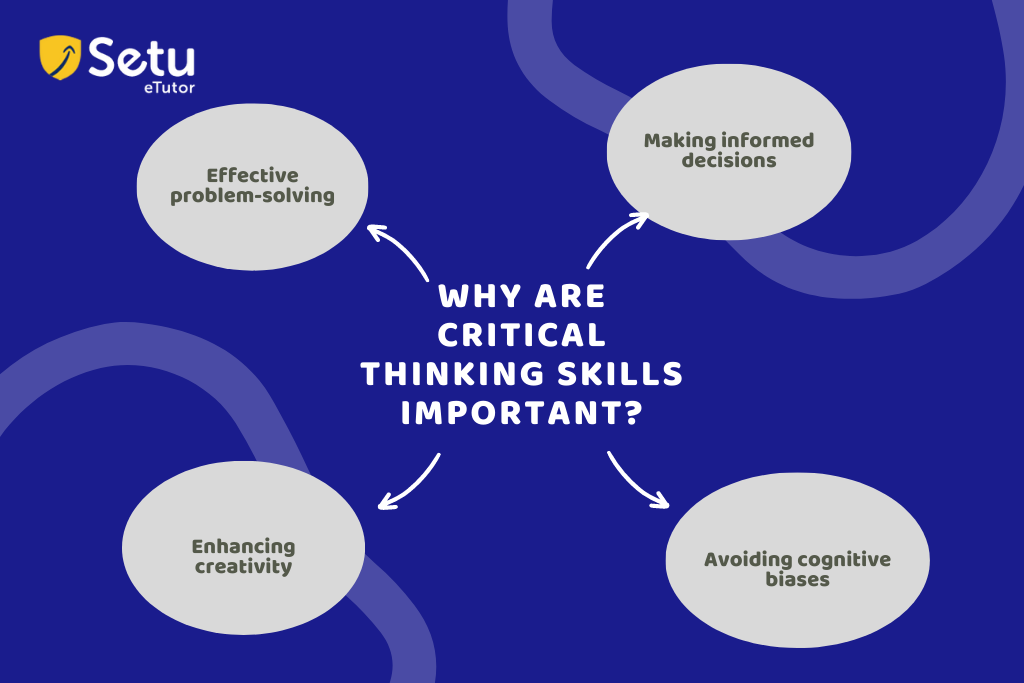
Here are a few reasons why these skills are important:
- Effective problem-solving: Critical thinking skills allow individuals to identify and define problems, analyze their root causes, and develop effective solutions. Individuals can overcome challenges more efficiently by approaching problems with a logical and analytical mindset.
- Making informed decisions: Critical thinking helps individuals gather relevant information, evaluate its credibility, and consider different perspectives before making decisions. It reduces the likelihood of impulsive or biased choices and promotes better-informed and more reasoned decision-making.
- Enhancing creativity: Critical thinking encourages individuals to think outside the box, challenge assumptions, and explore alternative perspectives. It promotes creativity and innovation by enabling individuals to generate unique ideas and solutions.
- Avoiding cognitive biases: Critical thinking skills help individuals recognize and overcome cognitive biases, such as confirmation bias or emotional reasoning. By being aware of these biases, individuals can objectively approach problems and decisions, leading to more accurate and reliable outcomes.
Next, we will see the types of critical thinking skills.
Types of critical thinking skills?
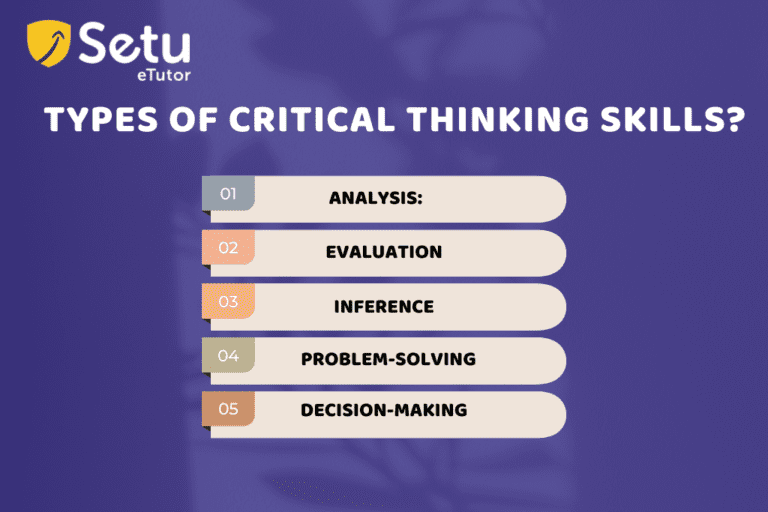
There are various types of critical thinking skills that individuals can develop. Here are some key types:
- Analysis: This involves breaking down complex information into smaller parts, examining their relationships, and identifying patterns or trends. Analytical thinking helps individuals understand the components of a problem or situation, allowing them to draw logical conclusions and make informed judgments.
- Evaluation: Evaluation involves assessing the credibility, relevance, and quality of information, arguments, or solutions. It requires individuals to examine the evidence, consider different perspectives, and judge based on reasoned criteria. Evaluative thinking helps individuals make informed decisions and avoid accepting weak or flawed reasoning.
- Inference: Inference refers to drawing logical conclusions or making reasonable assumptions based on available information and evidence. It involves connecting dots, filling in gaps, and making educated guesses. Inference skills enable individuals to go beyond explicit information and make reasonable inferences to understand underlying meanings or implications.
- Problem-solving: Problem-solving is a critical thinking skill that involves identifying, analyzing, and resolving problems or challenges. It requires individuals to think creatively, consider alternative solutions, evaluate the feasibility, and implement effective strategies. Problem-solving skills enable individuals to overcome obstacles and achieve desired outcomes.
- Decision-making: Decision-making involves evaluating available options, considering relevant factors and consequences, and selecting the best course of action. It requires individuals to weigh pros and cons, consider risks and benefits, and make choices that align with their goals and values. Effective decision-making relies on critical thinking to assess information and make rational judgments.
Critical thinking examples
Critical thinking skills vary from industry to industry. Here are a few examples as follows:
- In the healthcare industry, a triage nurse employs critical thinking to assess the cases and determine the priority order for treating patients.
- A plumber utilizes critical thinking skills to evaluate and select suitable materials for a specific job.
- Within the legal profession, an attorney engages in critical thinking by examining evidence and developing a strategic approach to win a case or make an informed decision on whether to settle outside of court.
- In a managerial role, critical thinking is applied by analyzing customer feedback forms to gather insights, which are then used to design a customer service training session for employees.
How does SETU help in improving critical thinking skills?
We all know that NEP 2020 encourages schools to develop students holistically. Critical thinking skills.
The SETU is an AI-assisted platform designed to foster the development and improvement of critical thinking skills in students. It offers a range of resources, activities, and interactive modules specifically targeting critical thinking enhancement.
Here are some ways in which the SETU platform helps in improving critical thinking skills:
Structured Learning: The SETU platform provides a structured and systematic approach to learning critical thinking. It offers a curriculum or modules to guide students through acquiring and improving critical thinking skills.
Interactive Exercises: The platform incorporates interactive exercises and activities that engage learners in applying critical thinking skills. These exercises may involve analyzing case studies, evaluating arguments, solving problems, or engaging in thought-provoking discussions.
Diverse Content: The SETU platform offers a diverse range of content, including articles, videos, simulations, and real-life examples, to expose learners to different perspectives and scenarios. This exposure helps develop open-mindedness and the ability to consider multiple viewpoints when critically analyzing information.
Collaboration and Discussion: The platform facilitates collaboration and discussion among learners. It provides opportunities for learners to engage in group discussions, debates, or peer reviews, enabling them to practice critical thinking skills in a collaborative and interactive environment.
Feedback and Reflection: The SETU platform often provides feedback and reflection mechanisms to help learners assess their progress and identify areas for improvement. This feedback may come from instructors, peers, or self-assessment tools, allowing learners to refine their critical thinking skills over time.
Real-world Applications: The SETU platform incorporates real-world applications of critical thinking skills. It may present learners with authentic scenarios or case studies from various industries or domains, encouraging them to apply critical thinking in practical contexts.
Continuous Learning: The SETU platform promotes continuous learning and improving critical thinking skills. It may offer resources and activities that allow learners to continue practicing and refining their critical thinking abilities beyond the initial learning phase.
By leveraging the resources and features of the SETU platform, learners can engage in purposeful practice, receive feedback, collaborate with peers, and gain exposure to diverse perspectives—all of which contribute to improving their critical thinking skills.
Conclusion:
Critical thinking skills are valuable assets at any stage of life, enabling individuals to engage in deeper and more meaningful thinking. Whether you are conducting research or a VP in a multinational company, applying critical reasoning becomes essential to interpret and draw meaningful conclusions accurately.
SETU aligned with NEP 2020 fosters critical thinking capabilities and helps learners develop a strong foundation for their future careers.
Are you excited to know more about how our platform SETU assists in building critical thinking skills? Please get in touch with us or schedule a demo now.

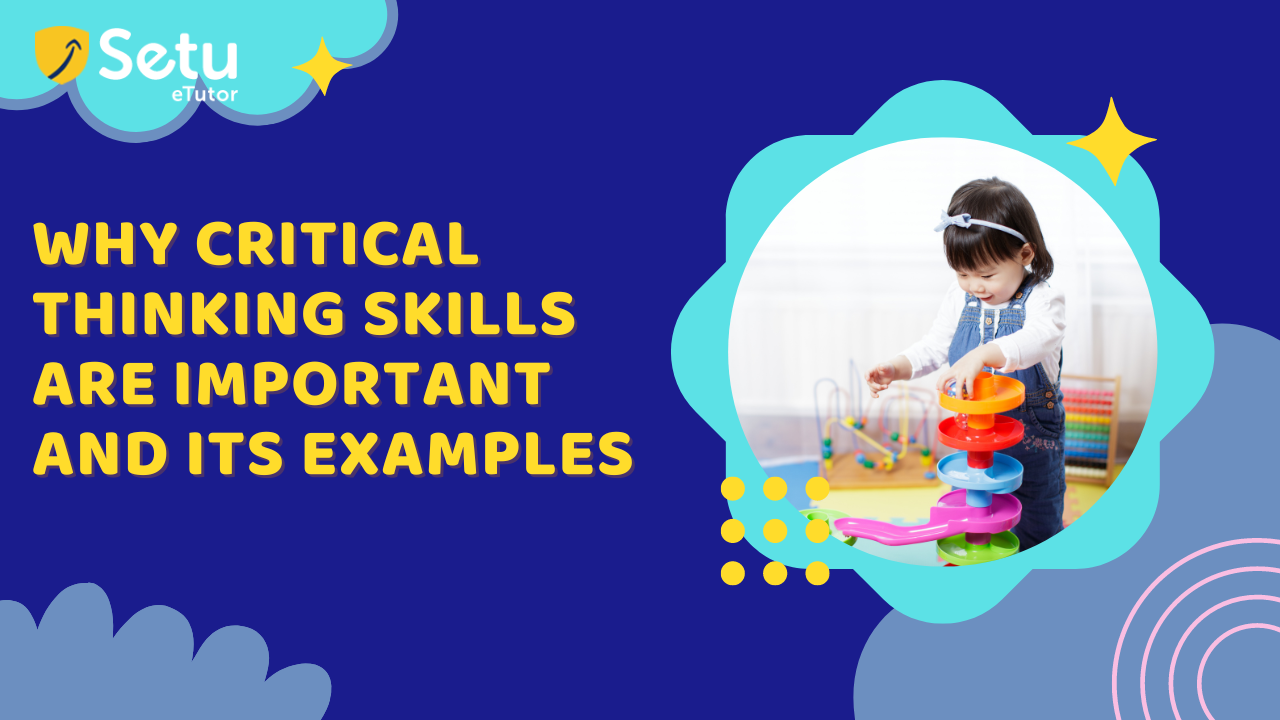



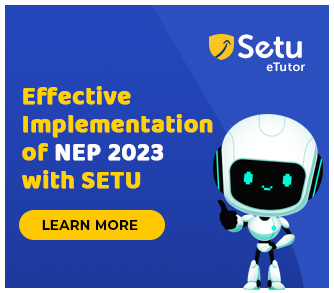
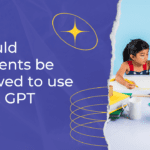

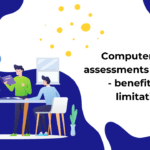
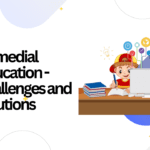
Leave a reply